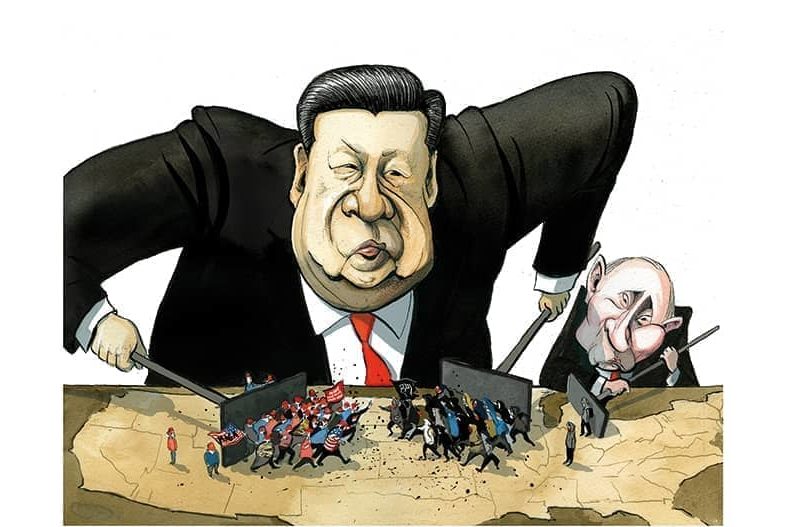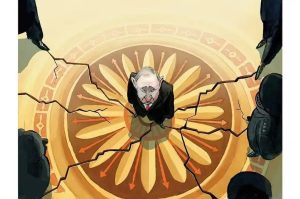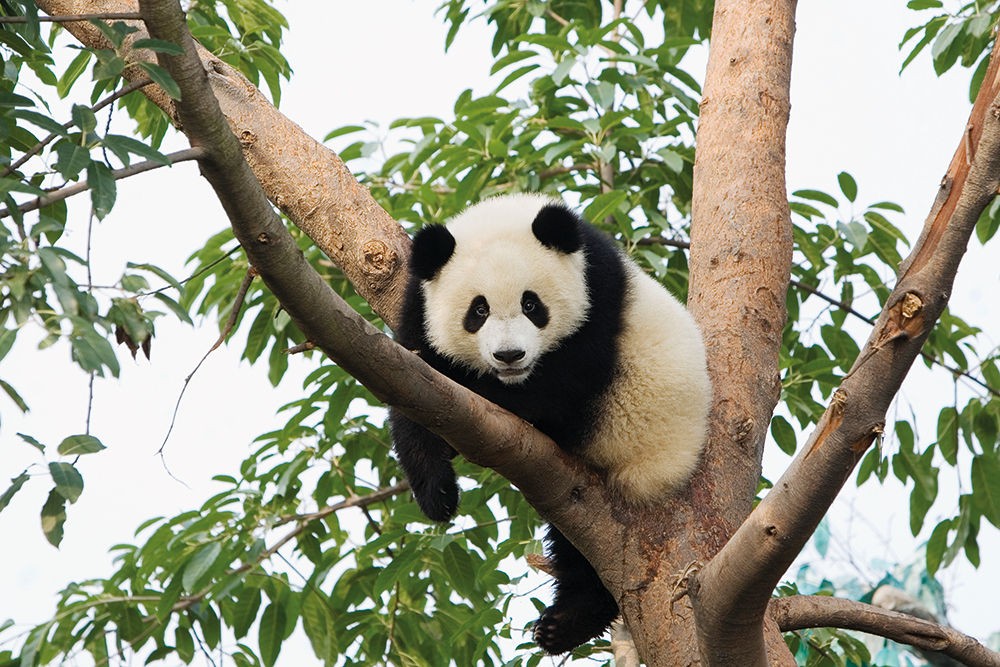Four years ago, Vladimir Putin and Xi Jinping made pancakes together in Vladivostok while thousands of their military forces conducted joint exercises in Siberia. This month, as China hosted the Olympics, Putin and Xi announced that a “new era” in international relations had begun, one in which the two great authoritarian powers of the twenty-first century will reshape the liberal international order established in 1945 and reaffirmed in 1991. Some call it Cold War Two, yet the blossoming relationship between Moscow and Beijing may best be thought of as an alliance of disruptors.
As Russia roils Europe over Ukraine and China turns its attention to Taiwan after crushing Hong Kong’s democracy over the past two years, these two historically major powers are reasserting themselves almost in tandem. As a result, prospects for global destabilization are greater than at any time since the last gasp of Soviet adventurism in the 1980s.
Beijing and Moscow are increasingly confident about their ability to disrupt western influence in areas near and far from their borders. They are becoming bolder in their attempts to frame narratives — even if that means peddling outright falsehoods — in order to delegitimize liberal institutions. They grow more and more comfortable with conducting aggressive behavior in the name of “self-defense” or global peace.
One should not go too far in presuming that Moscow and Beijing have become (as Mao Zedong once put it) as close as lips and teeth. A binding military treaty between the two is unlikely ever to happen and centuries of distrust will remain under the surface.
Since the seventeenth century, the two have clashed over territory in Siberia and jockeyed for power in eastern Asia along with Japan and the United States. As recently as 1969, they fought an undeclared war for seven months along their Ussuri river border.
Moscow has watched warily as Beijing has made economic and political inroads in Central Asia through its One Belt One Road program, gaining influence in areas once under Russian sway. Meanwhile, a resource-starved China has long looked covetously at the abundance of natural resources in thinly populated Russian Siberia and is eyeing up a polar navigation route through Russian Arctic waters that might cut weeks off the transit to Europe for cargo ships.
By objective geopolitical calculations, Moscow and Beijing should consider each other their biggest obstacle in dominating Eurasia. Yet ideology, opportunism and ambition make strange bedfellows. Indeed, Xi and Putin declared in their sprawling 5,000-word press release that there were “no limits” to either their friendship or their cooperation.
The nature of that “cooperation” is aimed at the “redistribution of power in the world,” according to their joint statement. The document warns of the “negative impact of the United States’ Indo-Pacific strategy,” criticizes Japan and expresses “serious concern” about the new Australia-UK-US (AUKUS) agreement, among a host of other complaints about western attempts to shore up the power of democracies in the east.
“Communist China is the biggest threat to freedom in the world,” notes Nikki Haley, former US ambassador to the United Nations. “With Russia as its junior partner, the threat is even more formidable.” Russia, for its part, gains a heavyweight diplomatic voice by working with Beijing. Moscow can use China to limit damage from western sanctions and gain access to alternative financial systems beyond western-controlled Swift bank transfers. Knowing that China is friendly, Russia can potentially shift military forces from the east to its western front, according to Jakub Grygiel, who worked on eastern Europe affairs for the US State Department’s Policy Planning Staff.
Buried in boilerplate statements of support for “global governance” and international organizations, the new allies are waging an intensely ideological campaign against free-market democracy — and the West underestimates this strategy at its peril. The two antagonists can coordinate their ideological attacks on western values, undermining the legitimacy of liberal societies while stoking class and racial divisions by feeding the culture wars that so dominate our media.
Ukraine is the most imminent crisis. Beijing has made clear it won’t help the West to defuse tensions, while at the same time cannily refusing to support Russia. Yet in joining Russia in opposing the expansion of NATO, and calling for “legally binding security guarantees” in Europe (for Russian interests), China shows more interest in keeping Putin happy than it does European leaders.
Conflict over Ukraine therefore suits Xi’s agenda perfectly. Any trouble in Europe which absorbs American (and Russian) attention is a geopolitical boon to China’s goals in the Indo-Pacific region. And even if NATO becomes reinvigorated in response to Putin’s threat, western powers are unlikely to take the added risk of challenging Chinese moves in Asia.
Britain’s post-Brexit plan to “tilt” to the Indo-Pacific is obviously a source of irritation in Beijing. Ideally, China would want the UK to be a member of the AUKUS alliance in name only. So it works well for China to have Britain focused on security issues in eastern Europe. Putin understands that.
There is little that Russia can do to help with China’s number one priority, Taiwan. However, as the joint communiqué indicates, Moscow can help Beijing’s long-term goals by further undermining the legitimacy of a US-led alliance and western efforts to build multinational networks in Asia.
Russia and China can together paint new US security initiatives, such as AUKUS and the Quad grouping of Australia, India, Japan and America, as a threat to regional peace. That gives Beijing and Moscow a means to gain influence with smaller countries in Asia and positions their Shanghai Cooperation Organization as the legitimate alternative.
On the economic front, Donald Trump’s decision to pull out of the Trans-Pacific Partnership helped strengthen China’s own Regional Comprehensive Economic Partnership and benefited One Belt One Road. Despite some warm words, the Biden administration has not yet indicated it will join the Japanese-led alternative to Chinese economic dominance, the Comprehensive and Progressive Agreement for Trans-Pacific Partnership.
Xi and Putin feel unchecked. The West’s failure to respond meaningfully to atrocities against the Uighurs in Xinjiang or the takeover of Hong Kong, as well as America’s shambolic withdrawal from Afghanistan in the first months of the Biden administration, only confirm their sense of ascendancy. “America’s capacity to defend itself from great powers diminishes the more our adversaries are able to call our bluff and see we are not able to bear the cost of proactive security,” argues Iowa senator Joni Ernst. Any further weakening of the US will reduce Washington’s effectiveness throughout Asia, call into question the credibility of its alliances and help further isolate Taiwan.
In other areas — such as global governance, arms control, cyber activity and space exploration — China and Russia proclaim their support for international cooperation. In reality, they prefer disruptive actions, such as their attempts to politicize international groups such as the World Trade Organization, the rapid modernization of their nuclear forces, continued rampant cyberattacks and anti-satellite missile tests. Moreover, China and Russia continue to destabilize both hemispheres, whether by shoring up North Korea or stirring up Argentinian fantasies of retaking the Falklands.
The age of Russo-Chinese disruption has been going on for a while, often supported by junior partners such as Iran, Pakistan or Venezuela. Moscow and Beijing’s recent announcement of their relationship simply formalizes policies long decided and actions already undertaken. The question those who wish to downplay the Moscow-Beijing axis must ask is: how much disruption is the West willing to bear?
This article was originally published in The Spectator’s UK magazine. Subscribe to the World edition here.

























